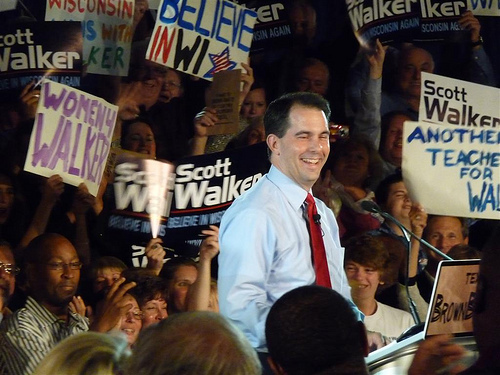School choice advocates are optimistic Wisconsin Gov. Scott Walker’s education proposals released February 18 will become law in some form, but they predict more protests in the state capitol before then.
Walker’s proposals include expanding the Milwaukee and Racine voucher program statewide, developing an independent board to oversee public charter schools, allowing students to take up to two state-funded classes outside their schools, creating a special-needs vouchers program, and removing restrictions on homeschooled students taking a few classes at public schools.
He also proposed increasing funding for charter and voucher students to approximately $7,000 per student per year, about $3,000 less than for public school students.
“Every child, regardless of their ZIP code, deserves access to a great education,” Walker said in a statement.
‘Shake Up the Status Quo’
Walker included these initiatives in his budget request, as he did with the 2010 collective bargaining reforms that sparked pandemonium in the capitol and a failed recall campaign against him. That will make the provisions harder to vote against.
“The last budget cycle shook up the status quo, and these proposals will shake up the status quo,” said Jim Bender, president of School Choice Wisconsin.
The governor also proposed increasing state public school funding by 1 percent after cutting it in 2010, and paying state colleges, K-12 schools, and teachers more for high performance.
“There are very vocal critics and supporters, and they are going to come out for droves for this,” said Christian D’Andrea, an education policy analyst for the Madison-based MacIver Institute, a free-market think tank.
The odd thing about Wisconsin voucher opponents, he said, is they typically also oppose evaluating teachers using student test scores, saying they want parents and students to have a say in evaluations. But they don’t trust parents enough to let them pick their children’s schools.
Political Prospects
The voucher proposal is likely to pass the state Assembly but have a tougher time in the Senate, said former Wisconsin Assembly Speaker Scott Jensen, a senior adviser to the American Federation for Children.
“There are some more senior members of the legislature who remember when the [Milwaukee voucher] program was first created 22 years ago, and thought of it as something for only the failing Milwaukee school district,” he said. “They’re having trouble understanding there are failing schools in their school districts as well.”
Even so, he said, legislators will actually consider “strengthening” the proposals. The proposed voucher and charter expansions are both limited to districts with at least 4,000 students and at least two schools the state has rated D or F. That’s currently just nine school districtss, of 426 total.
Senate Education Committee Chairman Luther Olsen (R-Ripon) and Senate President Michael Ellis (R-Neenah) have voiced concerns about vouchers, and Ellis blocked a voucher expansion last session. But not all state senators feel that way.
“Giving school districts the opportunity to improve access to quality education is a priority of mine,” said state Sen. Leah Vukmir (R-Wauwatosa). Vukmir’s spokesman said she supports the governor’s proposals.
Bender, Jensen, and D’Andrea all said they believe some form of increased school choice will pass.
How Parents Feel
In a January poll, 61 percent of Wisconsin voters said they support expanding the state’s voucher program to “every child.”
“Parents are really the only people well-suited to make the decision of what’s the best match between a student and a school, not a ZIP code and not a bureaucrat,” Bender said. Jensen said many schools have trouble spots where some kids fall through the cracks. On the National Assessment of Educational Progress, Wisconsin Asian and African-American students score significantly below national averages in math and reading, he noted.
Rural families are likely to go for the course choice program, Jensen said. Wausau schools recently cut Mandarin instruction, for example. Course choice means Wausau students could take Mandarin online or from private tutors.
“The governor’s responding to parents across the state and leading as fast as the political system will allow,” Jensen said. “If there are kids attending failing schools, they need another option.”
Image by Wisconsin National Guard.





